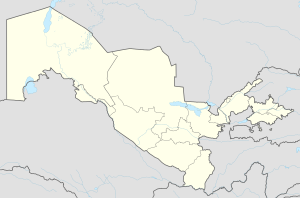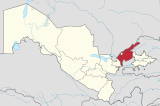Yangiyoʻl
Yangiyoʻl | |
|---|---|
| Coordinates: 41°06′45″N 69°02′48″E / 41.11250°N 69.04667°E | |
| Country | |
| Region | Tashkent Region |
| Elevation | 350 m (1,150 ft) |
| Population (2021)[1] | |
• Total | 61,700 |
| Time zone | UTC+5 (UZT) |
Yangiyoʻl (Uzbek: Yangiyoʻl / Янгийўл; Russian: Янгиюль, romanized: Yangiyul) is a district-level in Uzbekistan's Tashkent Region,[2] 20 km from the city of Tashkent. It has a population of 61,700 people.[1] Industry in the area includes textiles and paper.
The largest factories and plants in the city: Confectionery Factory, Bio-chemical Plant, Oil Plant, Wine plant, Paper Factory, Brick Production Plant, Canned Food Plant. Some of the factories and plants are in great need of investments. There are 18 schools, 3 colleges and 1 academic lyceum in this city. All the other city facilities, such as a park, a cinema, restaurants, bars and cafes are also available for the people living in that area.
The distance from Tashkent to Yangiyol is 20 kilometres (12 mi). Population: 80,000 (2001).
Famous persons
[edit]- Usman Yusupov - Politician.
- Azizullo Izzatullayev (1925 - 1991) is a state and public figure of Uzbekistan, deputy chairman of the executive committee of Yangiyol district (1962–1983), holder of the "War of the Fatherland" and "Mark of Honor" orders.
- Darvishbek Rahmonov (8.04.1952) is the founder, organizer, artistic director of the exemplary circus troupe "Kaldirgoch" and a well-known figure of the circus art of Uzbekistan.
- Ulugbek Soliboyev (4.08.1969 - public figure of Uzbekistan, head of the electrical industry department of Joint-Stock Company "Uzbekistan Temir Yollari", chief auditor.
- Rauf Parfi is a poet.
- Hamrokul Tursunkulov is a cotton expert, 3 times Hero of Socialist Labor.
History
[edit]Until 1934, it was named after the Qovunchi settlement. It is located on the right bank of the Chirchik River.
During World War II, in 1942, the command of the Polish Anders' Army was based in Yangiyoʻl, before it was evacuated from Uzbekistan to fight against Nazi Germany.[3] There is a Polish military cemetery in the city.[3]
References
[edit]- ^ a b "Urban and rural population by district" (PDF) (in Uzbek). Tashkent regional department of statistics.
- ^ "Classification system of territorial units of the Republic of Uzbekistan" (in Uzbek and Russian). The State Committee of the Republic of Uzbekistan on statistics. July 2020.
- ^ a b Ziółkowska, Ewa (2002). "Polskie groby w Uzbekistanie i Kazachstanie. W 60. rocznicę polskiego wychodźstwa z ZSRR". Wspólnota Polska (in Polish). No. 3–4 (116–117). p. 65. ISSN 1429-8457.


 French
French Deutsch
Deutsch





